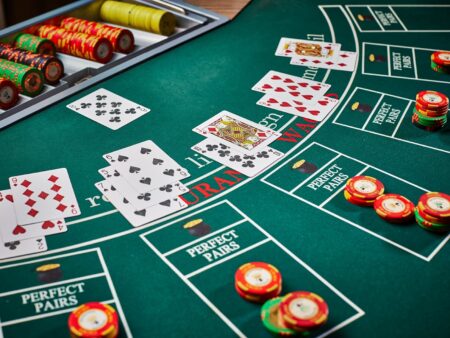Gambling is a game of luck so it is important to remember that the house always has an edge and gambling should not be used as a way to make money.
Games Of Chance For Money: How To Profit From Them?
Table of Contents
- 1 Games Of Chance For Money
- 2 Introduction
- 3 Probability of Winning in Gambling
- 4 Example of a Game of Chance Aimed at Winning Money
- 5 Why are People So Attracted to Games of Chance?
- 6 Types Of Chance-Based Real Money Games
- 7 What are the Winning Strategies in Games of Chance?
- 8 Risks in Games of Chance
- 9 Games of Chance Pros
- 10 Games of Chance Cons
- 11 Conclusion
- 12 Frequently Asked Questions
- 12.1 How do games of chance work?
- 12.2 What are examples of chance-based gambling?
- 12.3 What does it mean to play games of chance for money?
- 12.4 Are games of chance legal?
- 12.5 How can I be lucky in every game of chance?
- 12.6 What game of chance has the best payout?
- 12.7 What games of chance can I play for free and win real money?
Games Of Chance For Money
Introduction
Gambling is the wagering of money or something of value (referred to as “the stakes”) on an event with an uncertain outcome, with the primary intent of winning additional money and/or material goods. Gambling thus requires three elements be present: consideration, risk (chance), and a prize. Games of chance for money are gambling activities where players compete against each other for a financial reward. These games typically involve some form of skill or strategy, but still rely mostly on luck.
At its core, gambling is driven by three key elements: consideration, risk, and a prize. Consideration refers to the money or other assets that are wagered in the game, while risk refers to the uncertainty of the outcome. The prize, on the other hand, is the ultimate goal of the game, and represents the potential rewards that can be won by the players.
While gambling is often associated with games of chance, such as slot machines and roulette, it also involves games that require skill and strategy, such as poker and blackjack. These games combine elements of both luck and skill, creating a unique and dynamic experience for players. Overall, gambling is a multifaceted practice that is deeply ingrained in human nature. It is a game of risk that involves the wagering of money or other valuable assets in pursuit of a prize. While it can be a source of entertainment and excitement, it also carries significant risks, and should be approached with caution.
Probability of Winning in Gambling
The probability of winning in gambling is a critical factor that determines the appeal of gambling to players. It is the factor that draws players in, offering the promise of exciting rewards and the thrill of the win. However, the probability of winning in gambling is not simply a matter of chance or luck. It is a carefully calculated metric that is based on the odds that are set by the gambling operator.
In most gambling games, the gambling operator, or the house, has an inherent advantage over the players. This advantage is known as the house edge, and it is the primary factor that gives casinos their profits in the long term. The house edge can vary widely depending on the casino game being played and its rules.
Generally speaking, games of chance with higher stakes tend to have lower house edges than those with lower stakes. This is because the house can afford to offer better odds to players who are willing to bet more money. For example, in a game of roulette, the house edge is lower for bets placed on a single number than it is for bets placed on a group of numbers.
The calculation of the house edge is a complex process that takes into account a range of factors, including the rules of the game, the payout structure, and the probability of winning. It is a key factor in the design of casino games, and is carefully calibrated to ensure that the house maintains its advantage over the long term.

Example of a Game of Chance Aimed at Winning Money
One of the most popular gambling games is roulette. Roulette is one of the oldest and most popular games of chance played in casinos worldwide. The game has an undeniable charm that has been captivating players for centuries. The essence of the game is simple, yet thrilling: players place bets on which number they think a spinning wheel will land on.
The roulette wheel is divided into numbered and colored pockets, with a small ball being spun around the wheel in the opposite direction to the wheel’s rotation. As the ball slows down, it eventually falls into one of the pockets, determining the winning number. Players can bet on a single number, a combination of numbers, or even the color of the pocket the ball will land in.
Roulette is a game that relies purely on chance, with no element of skill involved. The outcome of each spin is completely independent of previous spins, and the odds of winning remain the same for each spin. The house edge in roulette is 2.7%, which means that, on average, for every $100 bet, the house expects to win $2.70. Despite the relatively low house edge, the game can still result in significant losses for players who bet recklessly.
One of the attractions of roulette is the range of betting options available to players. This allows players to customize their bets based on their risk tolerance and preferred betting style. Players can choose to place straight bets on a single number or spread their bets across multiple numbers for higher odds of winning.
Why are People So Attracted to Games of Chance?
Games of chance offer people the opportunity to win money with relatively low risk. There’s also an element of excitement that comes from gambling and playing a game of chance for money. For some, gambling can be a form of entertainment and many casinos have created Las Vegas-style atmospheres where gambling can be fun as well as profitable. Additionally, gambling is often considered a skill-based activity where players can learn and develop strategies to increase their chances of winning.
Types Of Chance-Based Real Money Games
Casino Games
Many gambling establishments offer traditional games such as blackjack, baccarat, poker and craps played with real money. In these gambling games, players compete against the house or each other for a prize based on their bet amount and odds.
Instant Win Scratchcards
Scratchcards are lottery-style gambling instant win games that require players to scratch off a series of symbols in order to win a prize. Generally, the more symbols a player matches, the higher their chances of winning and the greater their reward.
Online Bingo
Online bingo is a gambling game where players buy card tickets with numbers on them and then try to match their cards to the numbers called by the computer. Players who get a certain number of correct matches win a prize.
Lotteries
Lotteries are gambling games where players select numbers from a predetermined range and then wait to see if their selected numbers match the randomly drawn ones. If they do, they win a prize based on the odds of their selection.
Board Games
Board games such as Monopoly, Yahtzee and Backgammon are gambling games where players compete against each other for a prize. Players use strategies and skills to try to gain an advantage over their opponents and win the game.
Sports Betting
Sports betting is another popular gambling activity where players can bet on the outcomes of sporting events for money. In this type of gambling, bettors predict which teams will win games and place bets based on their predictions.
What are the Winning Strategies in Games of Chance?
The best strategy for gambling games of chance is to understand the odds and bet accordingly. When playing gambling games such as blackjack, poker or baccarat, it’s important to learn the rules and strategies associated with each game in order to maximize your chances of winning.
While there is no guaranteed way to win a gambling game, understanding the probability associated with different gambling activities can help players make informed decisions when selecting which gambling games they should play.
Additionally, learning basic gambling strategies can also help increase a player’s chances of succeeding in gambling activities. In summary, while luck plays an important role when gambling, having knowledge and skills can give players an edge over the house and other competitors in gambling games. With that being said, gambling should always be done responsibly and with due consideration for the risks involved. Games of chance can be exciting and enjoyable, but it is important to understand that gambling is a form of entertainment and not an effective way to make money.
Risks in Games of Chance
Gambling games of chance involve the risk of losing money, so it is important to understand the risks associated with gambling and play responsibly. Understanding gambling odds can help players make informed decisions about which gambling game they should play, as well as how much money to bet. It is also important to set gambling limits for yourself and stick to them.
Games of Chance Pros
- Opportunity to win money
- Exciting and entertaining
- Can be played with friends or family
- Wide range of gambling games available
Games of Chance Cons
- High risk of losing money
- Can be addictive
- Players can become overly reliant on luck
- Can cause gambling debt and other financial problems
Conclusion
Gambling games of chance can be an enjoyable form of entertainment if done responsibly. Players should understand the gambling odds and set gambling limits for themselves in order to minimize their risk. Additionally, they should learn gambling strategies to increase their chances of success. Ultimately, gambling is a game of luck so it is important to remember that the house always has an edge and gambling should not be used as a way to make money.
Frequently Asked Questions
How do games of chance work?
Games of chance involve gambling activities where players try to win a prize by predicting an outcome. The probability of winning is usually based on the odds associated with the game and can range from games like slots and roulette, which rely solely on luck, to gambling activities such as poker or blackjack which require skill in order to be successful.
What are examples of chance-based gambling?
Examples of gambling activities that are chance-based include slots, roulette, bingo and lotteries. These gambling activities rely on luck in order to be successful and usually involve randomly generated numbers or symbols.
What does it mean to play games of chance for money?
Playing gambling games of chance for money means risking money in order to try and win a prize.
Are games of chance legal?
The legality of gambling games of chance varies by country and region, so it is important to check the specific laws in your area before participating in gambling activities.
How can I be lucky in every game of chance?
Unfortunately, there is no guaranteed way to be lucky in gambling games of chance. The best way to increase your chances of success is to understand gambling odds and gambling strategies associated with the specific gambling game you are playing.
What game of chance has the best payout?
Generally, gambling activities that require some knowledge or skill such as poker or blackjack tend to have better payouts than games of pure luck like slots or roulette.
What games of chance can I play for free and win real money?
Most gambling games of chance require a stake or entry fee in order to be eligible for a prize, however some gambling sites offer free-to-play gambling activities which can allow players to win real money prizes.


















